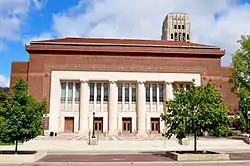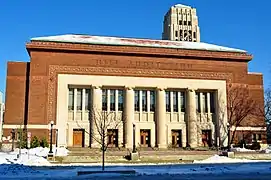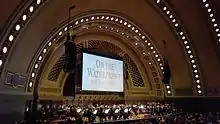Hill Auditorium
Hill Auditorium is the largest performance venue on the University of Michigan campus, in Ann Arbor, Michigan. The auditorium was named in honor of Arthur Hill (1847-1909), who served as a regent of the university from 1901 to 1909. He bequeathed $200,000 to the university for the construction of a venue for lectures, musical performances, and other large productions. Opened in 1913, the auditorium was designed by Albert Kahn and Associates. It was recently renovated by the same firm beginning in 2002 and was re-opened in 2004.
 Hill Auditorium shown in spring. | |

| |
| Location | Ann Arbor, Michigan |
|---|---|
| Owner | University of Michigan |
| Type | auditorium |
| Capacity | 3,500 |
| Construction | |
| Opened | 1913 |
| Renovated | 2002-2004 |
| Website | |
| www.music.umich.edu | |
With seating for up to 3,538 (originally 4,100 prior to the 2004 renovation) audience members, Hill is one of the most popular venues for large productions on campus. The building routinely hosts performances given by the Ann Arbor Symphony Orchestra and the School of Music's various ensembles, including the University of Michigan Symphony Orchestra, University of Michigan Philharmonia Orchestra, University of Michigan Concert Band, University of Michigan Symphony Band, and University of Michigan Choirs, as well as the mostly non-major ensembles such as the University of Michigan Arts Chorale, the Campus Symphony Orchestra, Campus Bands, the Michigan Marching Band, and the Men's Glee Club and Women's Glee Club. The auditorium is also host to the Detroit Catholic Central High School and Father Gabriel Richard Ann Arbor graduation each May.

Hill Auditorium's acoustics have been widely praised. The University of Michigan website that describes the recent $33.5 million Hill Auditorium refurbishing and restoration states:
"When it opened in 1913, Hill Auditorium was hailed as a 'monument to perfect acoustics.' The excellent acoustics, a result of collaboration by architect Albert Kahn with noted acoustical engineer Hugh Tallant, are known world-wide and have made the auditorium a favorite venue for legions of famous musicians and other artists, as well as numerous noted speakers."
"Careful attention will be given throughout the renovation to maintaining the acoustic quality of Hill, said Henry Baier, associate vice president for facilities and operations. In addition, further work will be done to reduce street and lobby noise by building a “sound lock” between the lobby and the auditorium."[1]
Michigan's University Musical Society presents performances of many world-renowned artists at Hill Auditorium.
The hall's unique oval-shaped stage has seen performances by Rachmaninoff, Prokofiev, the Denishawn Dance Company, the Vienna Philharmonic, the Berlin Philharmonic, the Boston Symphony, the Chicago Symphony Orchestra, the Cleveland Orchestra, New York Philharmonic, London Philharmonic Orchestra, the Leningrad Philharmonic, the Chamber Orchestra of Philadelphia, the Lahti Symphony Orchestra, Jan Kubelik, Jascha Heifetz, Fritz Kreisler, Carl Flesch, Eugene Ysaye, Efrem Zimbalist, Myra Hess, Ravi Shankar, Anne Sofie von Otter, Audra McDonald, the Kremerata Baltica, the Israel Philharmonic Orchestra, Emilia Parks Butryn, the Lincoln Center Jazz Orchestra, Enrico Caruso, Joan Sutherland, Birgit Nilsson, Robert Frost, Jessye Norman, Van Cliburn, Yo-Yo Ma, Vladimir Horowitz, Helen Hayes, Cecilia Bartoli, Eugene Ormandy, Leonard Bernstein, Isaac Stern, Benny Goodman, Harry Chapin, Dave Brubeck, Jack DeJohnette, the Leipzig Gewandhaus Orchestra, Alexander Frey, Louis Lortie, the Oslo Philharmonic Orchestra, Wynton Marsalis, George Winston, Elton John, the Grateful Dead, Brandi Carlile, Rufus Wainwright, I'm With Her, and Lupe Fiasco among others.[2]
Design concept

Carol Rose Kahn, the architect’s granddaughter recounted that her grandfather had set out to develop a hall with perfect acoustics. The brief was to design an auditorium that would seat five thousand people, where they could hear from every seat. The only known previous example was the Mormon Tabernacle where, it was said that one could hear a pin drop from the stage to the top balcony, although the chamber suffered from excess reverberation.
Being aware that only one man in the country who was pre-eminent at that time – Hugh Tallant, partner of Henry Beaumont Herts – Kahn wrote to ask him if it would be possible to build an auditorium for five thousand people, where they'd hear from every seat. Tallant responded, but only after several months had elapsed, to the affirmative; so Tallant designed the acoustics. The result was an auditorium in the shape of a megaphone. The granddaughter said: "Hill Auditorium was nearly finished when I was fourteen or so. My father and I went out to Ann Arbor. Father stood up in the last seat of the second balcony, and I went down on the stage. On my word of honor, I dropped a pin and he heard it."[3]